Shelina Zahra Janmohamed's Blog, page 14
September 19, 2011
Journalism and the Islamic moral system
I came across this blog post which was written about the launch of a Communications studies programme at an Islamic University. You can skip past the praise of the course itself, but there are some interesting reflections further down on how Islamic values should be manifested in the way that journalism and media are practised. It's an interesting perspective…
Here are a couple of quotes:
A journalist who uses his/her faculty of observation, reason, reflection, insight, understanding and wisdom must realize that these are the Amanah (trust) of God and must not be used to injure a human soul or destroy society for the sake of self-promotion or for selling media contents.
and
the Social Responsibility Concept which is one of the four major theories of Mass Communications is not different from the Islamic concept of Al-Amaru bi al-maruf wan- nahyi an al-munkar, to wit, commanding right and prohibiting wrong.'
This implies that it is the responsibility of every individual and group, especially the institutions of social or public communication such as the press, radio, television, and cinema, to educate the public on the need to work for the collective growth of society.
Definitely worth reflecting on given the increasing power of the media in democracies, and of course with recent events including one Mr Murdoch.
September 17, 2011
People are the power for change not gadgets or websites
This is my weekly newspaper column published in The National.
I worked on the very first mobile phone for Apple. The iPod had already wowed the world, and now a global population was waiting for Apple to take the step into mobile technology. The handset wasn't the iPhone that we know today, but a precursor: a Motorola phone loaded with an iTunes application. This allowed the user to transfer up to 100 songs onto the phone using the app. It was 2005 and I was the product manager for Motorola responsible for the handset across Europe and the Middle East.
In the trenches at Motorola we were inflated with excitementat bringing the first Apple phone to market, but our delight was tempered by the press, who were frustrated at its limited capability. Real users, too, weren't willing to suffer compromise.
The public announcement of the first iTunes phone should have been tumultuous. Instead, Steve Jobs eclipsed Motorola with the launch of the iPod Nano on the same day. Our chief executive Ed Zander wasn't best pleased and publicly dismissed the Nano: "Who listens to 1,000 songs?" History would prove Jobs right, and Zander woefully wrong.
Jobs has recently departed his role at the top of Apple. For all the criticism that Apple receives, its popularity is partly due to the fact that its technology is not an end in itself but instead enables users to do things more easily. On the flip side, as one executive commented on the launch of the Nano and as Zander found out, working with Apple is like dancing with the devil. It's unpredictable and you may be outsmarted.
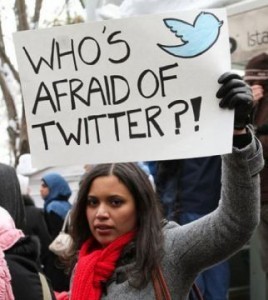 The same is true of anyone trying to tame a technology. Technologies take on the life of those who invest them with content and meaning. They are only as powerful as the imaginations of those who use them.
The same is true of anyone trying to tame a technology. Technologies take on the life of those who invest them with content and meaning. They are only as powerful as the imaginations of those who use them.
Hosni Mubarak learnt that at his peril. First he tried to shut down the internet and mobile networks to thwart the Egyptian uprising. It did the opposite. Then he tried to use them to disseminate his propaganda, and that just made his position more precarious.
Internet and mobile technologies like Twitter, Facebook and smartphones were credited for the revolutions of the Arab Spring. In the UK, the recent riots were blamed on them.
Take this comment on the role technology plays: "A means of communication, a privileged expression of the general transformation of social communication in a moment of change, a new management of time, speech and political discourse."
Except this description isn't about the Arab Spring's use of Twitter. It was written more than 200 years ago at the time of the French Revolution by the Frenchman Pierre Retat with regards to printed material and its role in the political change.
In the 19th century, such thinkers as Thomas Carlyle and John Stuart Mill wrote about how the move from books to journals to newspapers was changing the dynamic of political power and influence.
All of these technologies, from print to Twitter and everything in between, act only as catalysts in political change – they are not the cause of it. They are not the spark, the content, the aspiration, the blood. Yes, the revolutions may have taken a different course without them. Yes, they heightened the speed and ferocity of the uprisings. But we must be clear that it is people – not technologies – that make change happen. Let's not diminish creativity and courage by attributing great sacrifice to amorphous, faceless technology.
September 14, 2011
The Ramadan season is over. So what now for Muslim brands?
This article was published at FT.com
You've spent a huge chunk of your annual budget reminding your Muslim consumers that your brand exists. You've persuaded them to buy your products during the month of Ramadan and secured sales over Eid. You're not alone. Your branding peers have been out doing the same.
 But now Ramadan is over and Eid is already fading to a distant memory. What do you do keep up the momentum? Do you sit around moping till next year? Do you reminisce about the spike in sales during the month of daylight fasting and the celebrations that follow?
But now Ramadan is over and Eid is already fading to a distant memory. What do you do keep up the momentum? Do you sit around moping till next year? Do you reminisce about the spike in sales during the month of daylight fasting and the celebrations that follow?
In the UAE consumption shot up by 30 per cent on the eve of Ramadan. Some $2.2bn was spent on advertising in Ramadan in 2010. Some companies use as much as 78 per cent of their advertising budgets during this time. But once Ramadan and Eid have passed – then what? Is the Muslim consumer to be forgotten? This is where deep insight is crucial, but where many brands fall down.
It's not all over – quite the opposite. According to the Pan Arab Research Centre: "Post-Ramadan there is more economic activity. The month instills new energy into the system."
September 10, 2011
It's time for Muslims to reclaim their image
This is my weekly newspaper column published in The National (UAE).
A decade after September 11, how I long to declare that warmongering has been vanquished and peace flourishes. But sadly, the 10 years since the horrific deaths in New York have seen increasing war, growing suspicion and greater rather than less terror.
Muslims have been scrutinised, demonised and held to collective blame for the events. They have been accused of plotting to install Sharia in the West, of being violent villains poised to wage global jihad on a liberal enlightened Occident, and of hating democracy.
These types of ideas are memes – thought patterns replicated via cultural means, like viruses of the mind. These parasitic codes have come to proliferate so widely in the West's collective consciousness and are repeated so often and so brainlessly that they are almost accepted as truth. The fact is they have been deliberately and maliciously implanted into popular thinking since 9/11.
But since the beginning of the year, events have taken an unexpected turn – a turn that offers Muslims a historic opportunity to change the lens through which they have been framed, a chance to expose these memes as the falsehoods they are. Muslims must grasp this moment.
The most prominent memes are that Muslims are inherently violent, opposed to democracy and want to impose Sharia. But the Arab Spring defies these ideas. Across the Muslim world, it wasn't Sharia that Muslims wanted. People rose up for democracy, deposing dictators one after another. And in Egypt, we saw an object lesson in peaceful revolution.
Muslims who live in the West are eyed suspiciously as fifth columnists. The accusation is that they are disloyal. But in a Gallup poll released last month, 93 per cent of Muslim Americans say they are loyal to their country. And a Pew Research Center poll published last week found that Muslim Americans exhibit the highest levels of integration and the greatest degree of tolerance among major American religious groups.
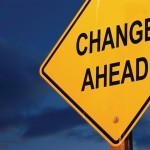
Another meme is that "all terrorists are Muslim". But the Norwegian extremist Anders Breivik was the most high-profile proof of the underlying fact that the majority of terrorist acts are not planned or carried out by Muslims at all. Check Europol for figures in Europe. Check CIA statistics for incidents in the USA.
One of the most powerful pieces of information to come to light is a report released last week by the American Center for Progress called "Fear Inc. The Roots of Islamophobia". It has traced the sources of the fabricated memes to just a handful of funders, and a handful of so-called "experts" who try to take on the mantle of fanning fear and exaggerating threats. The echo chambers they use to amplify their voices are designed to make it appear that this hatred of Muslims is widespread – another falsehood they want to perpetuate – but it is not. The memes by and large stem from them, their funding and their handful of cronies. Their time is now up.
It is Tariq Jahan, a British Muslim who lost his son during this summer's riots in the UK, who best embodies this moment of change for Muslims. "I'm a Muslim," he announced on national TV, without fear or apology, but rather to explain that his strength and compassion came from his faith. He united a nation in grief and in dignity where politicians had failed. His dignity and his humanity changed minds about what it means to be Muslim. He instinctively knew that for Muslims the time is now. They must seize this opportunity to lay the myths to rest.
September 4, 2011
Skin whitening – the prejudice, obsession and discrimination goes on
This is my weekly column published in The National yesterday.
During the Eid celebrations this week, aunties gathered in one of the upstairs bedrooms deciding how to distribute presents to the children. Holding up a dress, one of them proclaimed: "There's no point giving the pretty dress to that baby, she is too dark. Whatever she wears will look ugly on her. Better to give it to the fairer one, she always looks so pretty."

Obsessions with skin whitening - if the products really work, why aren't we swimming in white people?
I felt anger that a baby could be called ugly, and a more visceral rage that darkness was being equated with ugliness. I felt protective towards this baby who I didn't know. Being born into a surrounding with these attitudes meant she was due to suffer a double setback – growing up with those who diminished her worth because she is "dark", compounded by the fact she would be the dumping ground for poorer gifts, opportunities and respect.
This is not a one-off story, but an attitude so embedded in subcontinental culture that people take it as a given that white is better. White females are more prized as wives and daughters-in-law, snapped up in the marriage market, like sheep or cattle.
The whiteness has nothing to do with the beauty of the features. It's just the colour that is important. White is seen as successful, connected with status and wealth. It's a trend that echoes across the Far East as well as in the Middle East.
A survey by Asia Market Intelligence revealed that three quarters of Malaysian men thought their partners would be more attractive with lighter complexions. In Hong Kong, two thirds of men prefer fairer skin.
Wherever such deeply-rooted cultural attitudes exist, the commercial world is never far behind. Products that promise to lighten and whiten skin are rife, promising professional and personal success and marriage.
The global skin-lightening market is predicted to reach US$10 billion (Dh36.7bn) by 2015. And a Datamonitor report released last month says the market for skin-whitening products grew 16 per cent year on year between 2005 and 2009.
Some of these products contain horrific ingredients such as mercury in mind-boggling quantities, such as 65,000 times the acceptable limit, which can cause vomiting, coma and even death. The fact that many women feel compelled to use these cosmetics despite the health risks, spending a considerable proportion of their income especially if poor, and in some cases contravening bans that exist on such products in many countries, is testament to the intense pressure facing women to whiten up.
At the other end of the market are products that are tested and found safe, usually from big-name brands. But experts suggest that while they do no harm, they are unlikely to do much whitening. If they were, wouldn't these countries be swimming in white people by now?
There are arguments that this is nothing to do with race or prejudice but about looking different to the norm. Brown people want to be white, and white people want to be tanned.
But white-skinned people don't want to look tanned in order to look Asian or Black, whereas for brown-skinned people being called "white" is the ultimate compliment.
At the same Eid gathering as the shocking baby incident, a wedding album was passed round. The bride's face was ghoulish beneath chalk white foundation. "So beautiful!" gasped the aunties. "So white!" But the only face that was actually white in a roomful of brown Asians was mine: white with disgust.
August 29, 2011
Ramadan nostalgia – the aromas and tastes of childhood memories
This was my weekly newspaper column from a couple of weeks ago.
The air, just as the time to break the Ramadan fast draws near, feels different. It's not just the sweet softness of dusk that means that you can almost taste it in your mouth like melting caramel, or the golden haze of the sun diffracted through the kitchen window that makes its scent linger like the smell of cookies browning in the oven. It is that the air at the time of iftar carries the fragrance and memories of childhood.
If as an adult you can never find food that is as tasty as your mother's cooking, then the food she cooked for iftar is a hyperbolic form of nostalgia evoking heightened senses.
For me, it is the smell of roti, Indian unleavened bread, that triggers the nostalgia.
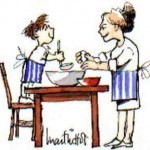
image courtesy of wholefamily.com
They were hand-kneaded from wholemeal flour and water, a task that I took over once my child's hands were large enough to grasp the sticky ball, and strong enough to pummel it into a stretchy dough.
I would help my mother roll it into perfect circles and then let it cook in an iron griddle for a few seconds on each side, flipping it backwards and forwards until it was cooked all the way through and evenly toasted on both sides. I would then cover it with butter, place it with the other rotis, and close the lid firmly on the tin so they stayed moist and soft until the time for iftar.
Ramadan is not just about memory, it is about tradition and culture. And so while the rotis of my Indian extraction still make my mouth water, my East African heritage evokes Ramadan's sense of reconnection to my roots.
My favourite of these is the most deliciously named, and delicious tasting Makati Mamina. It is an East African sweet made of ground rice, coconut and yeast, and then gently cooked in a large deep frying pan until the coconut rice has set into a gooey crumbly sweet. To give it a golden kiss it is then grilled until brown on top.
For me, that is the taste of Ramadan.
I was reminded of this dish when I was sent an email of traditional Ramadan recipes from a friend of a background similar to mine.
It was circulated among those of us who had shared childhoods drooling over the same iftar foods.
I read through the recipes not just with my taste buds on fire, but with my rose-tinted spectacles pushed firmly back on the bridge of my nose remembering a more innocent and pleasurable Ramadan.
There was no work, no childcare duties, no worries about the world to interfere with the pure task of fasting.
The reason those rotis and that makate still taste so good is not just because nostalgia makes food taste better.
It is because it reminds me of a time when I was more innocent. And innocence doesn't just heighten taste – it heightens gratitude for what you have, through the sheer pleasure of having it, through the simple accomplishment of the task of fasting.
As an adult that gratitude comes from another source: the result of understanding that we are fortunate for what we have when so many round the world, like those many thousands of people suffering from famine in East Africa, have not just little, but nothing.
As an adult that means the goal of the fast has been achieved: it reminds us not just of the pleasure of food but the pain of others.
August 27, 2011
Anticipating the first coffee of Eid, and the pleasure and sadness it brings
This is my weekly newspaper column at The National, in anticipation of Eid this week.
Eid celebrations will be taking place around the Muslim world this week. It's a time, rightly or wrongly, of indulgence and pleasure: fine clothes, good food, high-fat, high-carbohydrate sweets. It's a day when the spiritual focus of the previous 30 days is mostly forgotten, even though Eid is supposed to be a celebration of spiritual renewal, a cleansing of sins and of a fresh start.

Dear cappuccino, let me count the ways I love you
I confess that although I aim to uphold this sacred meaning of Eid, I'm not immune to engaging once more in the pursuit of pleasure in the daytime. The first exciting thing about the day of Eid for me is my morning cup of coffee. Its consumption is a celebratory ritual. My husband and I will usually go to our favourite cafe and breathlessly order a cappuccino, excited at its return to us after 30 days of daytime exile.
The cappuccino – above other kinds of coffee – offers us the opportunity for a beautifully decorated reintroduction to the flavourful morning shot of caffeine. The froth is elegantly smoothed over, like the icing on a birthday cake, and freshly ground cocoa is sprinkled on it in the shape of a pretty heart or coffee bean.
We normally stare at the coffee, then at each other, then back at the coffee. After a month of absence, our hearts have grown fonder, and we are enraptured by the return of the beloved. Lifting the coffee cup to my lips after a month of daytime separation, I experience the reunion of lost lovers.
Even now as I write this in anticipation of Eid morning, I feel mixed emotions about my longing for that first sip of coffee. The shiver of delight as the first warm drops slide down my throat. The disappointment in myself that, having given up coffee for a month, I should so easily return to my (mild) addiction. The sadness at the loss of Ramadan's intense spirituality.
What my cappuccino also reminds me of is the distinction that each human being faces between the pursuit of contentment and the pursuit of pleasure. These are clearly different things, although at times we may confuse them. Pleasures need not be shameful or sinful. My coffee is neither, and gives me intense pleasure, and pleasure is rightly a part of the human experience. But as the coffee warms my mouth, I can't help but recall the preceding month of Ramadan where it was the pursuit of contentment that was paramount.
Contentment is a funny beast. Talking of its pursuit is perverse – you cannot chase it, rather it must come to you. Sometimes you don't know you were contented till the moment has passed. That is the essence of Ramadan. The emptiness of the belly, the lightheadedness of the body, when first experienced, feel like physical torture. But slowly – and often in hindsight – we learn to identify that the absence of pleasure has created a space and a stillness that allows contentment to settle, despite its elusiveness.
Rumi says: "There is an unseen sweetness in the stomach's emptiness. We are lutes. When the soundbox is filled, no music can come forth. When the brain and the belly burn from fasting, every moment a new song rises out of the fire."
Eid is a day of transition where we learn to reintroduce the pursuit of pleasure into our daylight hours. Will I still be able to hold on to the slippery creature that is contentment? I'll let you know after I've enjoyed my first cup of coffee.
August 20, 2011
New mummies sometimes wish we didn't have to work and could just look after our babies. Is it heresy to say such things?
This is my weekly column published today in The National newspaper.

Enjoying baby

Stay at home mum?
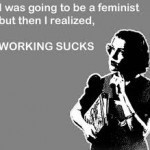
or is it that looking after baby is really quite fun...?
In the darkness of the night when I wake to feed my baby, I hold her close to me as I have each night since she was born. Yesterday was her seven-month birthday.
I know her facial expressions from every angle, the way that she gently sighs when she has drunk enough milk and is ready for her nap. I know that when she drops her head to one side she will slither away through my arms to escape. I know that she loves to poke her curious little fingers into my mouth and then smile. I imagine it's baby code for, "I love you Mummy."
When will she able to say these words out loud, I wonder, because already at seven months she feels as though she is a little person.
She and I have created our own social network. We get together with other new mums and babies to compare notes on nappies, sleeping and weaning. We attend baby classes with catchy nursery rhymes and twinkling lights that mesmerise the tots.
But while the classes are purportedly to aid baby development, they are really a release for us mums. We need it. For the first time we are no longer out in the world but tied eternally to these creatures that are at once gorgeous and frustrating, delicious but utterly restricting.
My mummy peers and I have had university educations, worked for the largest global companies, set up our own businesses, travelled the world, and have flown the flag for the modern woman who maximises her opportunities, and appreciates every gift the women's equality movements have given us.
But as we now sit together, cuddly little babies on our laps, words cross our lips which we had never imagined we would say: We wish we didn't have to work, that we could just stay at home and look after our babies. Is it heresy to say such things?
I dare not look the aunties and grannies in the eye when I am thinking these thoughts, for fear of eliciting tuttings, raised and knowing eyebrows, and "we told you so". But I also wobble when trying to assert my feminist credentials – after all, shouldn't I be supermumming it and having it all?
I thought I had it sussed but the baby has made me reassess everything I thought I knew about being a woman. It's not just questions about career, travel or public participation that she has made me confront. I thought all of those male-dominated arenas were the bedrock of running the world which we women had to break into.
I still think that's important. But I've discovered that while those men are busy trying to run the world, it is the mothers who are busy running real life.
It makes me want to shout out "Let's hear it for motherhood!"
In the blossoming of my love for the Little One, I have also seen myself grow even more loving and compassionate towards my own parents. After all, I now understand and appreciate their toil in nurturing me, through the joyful milestones that go hand in hand with the hardships of childcare.
This process of self-redefinition has recast me from lonely individual into a link in the human chain. And it has brought home the truth of the words: "There are two lasting bequests we can give our children: One is roots, the other is wings."
Surprisingly, it is my new little appendage that has helped me strengthen my roots and given me wings. Let's hope I can do the same for her.
August 11, 2011
Tariq Jahan's response to his son's death shows a dignity and respect that teaches us all an important lesson
This article was published today in The New Statesman. Tariq Jahan's response to his son's death shows a dignity and respect that teaches us all an important lesson
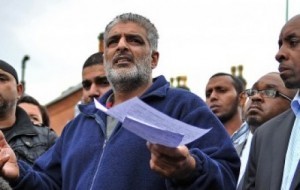 From the terrible events of the last week, an unexpected hero has emerged in the shape of Tariq Jahan.
From the terrible events of the last week, an unexpected hero has emerged in the shape of Tariq Jahan.
In the face of the loss of his son and two friends in a hit-and-run incident in Winson Green in Birmingham on Tuesday night, he has shown a dignity and wisdom that has been lacking in public figures. And it is his belief in shared humanity and community that has touched the soul of the nation and put him on the front pages of newspapers across the political spectrum.
He talked of his loss as something that "no father, mother, brother, sister should have to endure". His appeal to us at this terrible time of violence and uncertainty is that he reaches out to our common human instincts.
But the fact that he had to emphasise that "this is not a race issue", and that he had received messages from people of "all faiths, colours and backgrounds", tells us more about how our society has been carved up by political and media rhetoric than we might care to admit. To the backdrop of the mantra that multiculturalism has failed, and the background voices that this is black violence, it has taken a voice from the grassroots — essentially an ordinary man that sees a reality that politicians have failed to acknowledge — to remind us that a strong sense of community still exists, in spite of what politicians say divides us.
And, as Cristina Odone explains in the Telegraph today, this is especially strong amongst immigrant and faith communities. The "Big Society" and the "community" that Cameron is so keen on have been in greatest evidence in these places.
But what makes Jahan the unlikeliest of British heroes is the fact that he is a British Muslim of Asian background from Birmingham. Jahan's city and faith has been cited in the past with accusations of segregation, ghetto-isation and a rejection of "Britishness" and "British values". Yet he has expressed that it is his faith as a Muslim that is giving him strength at this difficult time. His words "I'm a Muslim" have been published in newspapers across the political spectrum, including in the right-wing press who days earlier might well have featured him further into the paper attending prayers during this current Islamic month of fasting Ramadan under the title of "creeping Islamisation", "Muslim ghettoes" or some other such fear-mongering.
He has tied his faith in Islam with his belief in community, specifying that whether it is your own community or the local community, "it doesn't matter who you are, we're here to help everybody."
Does that mean Muslims will now finally be seen as part of society? Given that Jahan publicly declared his Muslim faith, will the positive effect of his religion be acknowledged?
He is not the only one whose religion has been playing a positive role. Since this is Ramadan, a time when Muslims generally display a very strong sense of community, it comes as no surprise that Turks in north London stood outside their premises to defend them. "Bloody immigrants. Coming over here, defending our boroughs & communities", half-joked the Twitterverse.
Outside East London Mosque — maligned endlessly for being an alleged hotbed of extremism — young men leaving the mosque after Ramadan prayers chased down the looters. In the same way that the Turks were not described by their Muslim faith, these worshippers were not described as Muslim either, but rather as Bengalis and Somalis. There was little acknowledgement of the positive role of their faith. Even some of the victims are airbrushed: there has been little coverage of the mosque opposite the burnt out carpet shop in Tottenham whose worshippers contended with night prayers during the mayhem.
These events must make us think differently about our approach to immigration and to Muslims. They are not the demons of our society, they are not the scapegoat for our woes. Rather, they can and should be our heroes.
Jahan, the grieving father said: "Please respect the memory of our sons." Accepting Muslims and immigrants as an integral part of our communities is the most powerful means we have to show that respect.
August 7, 2011
Gallup report adds to mounting evidence that Muslims are loyal (shock!), non-violent (shock!) and tolerant (shock!!!)
This is my weekly column published yesterday in The National newspaper. It refers to a poll released by Gallup this week about Muslim Americans.
At first glance, the headlines covering this week's Gallup report on the state of Muslim Americans, were pleasing. "Muslims are loyal to the US," reported The New York Times. "Muslims condemn attacking civilians," said the United Press International news agency.
Here was clear evidence challenging those who perpetuate fear and prejudice by claiming that Muslims are some kind of fifth column.
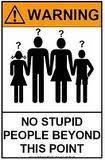
The evidence is plain to see
My pleasure turned to irritation the more I read. Exclamation marks implicitly followed findings that Muslims oppose civilian deaths!!! Muslims do not see conflict between faith and country!!! Muslims oppose violence!!!
In between the implied surprise of the headlines, the media coverage gave us snippets of new and fresh information. I wanted to know more. Despite the financial crisis and campaigns such as that against the so-called Ground Zero mosque and real attacks on Muslim places of worship, Muslim Americans are feeling optimistic. Since the last iteration of this report, the feeling among younger Muslim Americans that they are thriving rose to 65 per cent from 40 per cent. Jewish Americans are most likely to have the greatest empathy with Muslim Americans.
Yet, instead of columnists trying to make sense of such intriguing phenomena, it was Muslim loyalty, tolerance and opposition to violence and terrorism that were seen as news.
This, despite the fact that these same results keep being found, keep being published – and keep being greeted with surprise.
In 2006, CNN-IBN-Hindustan Times conducted a survey of 29 Indian states, and concluded that Muslims suffered under a "myth of extra-territorial loyalty", pointing to the fact that all but two per cent of Muslims said they were "proud" or "very proud" of being Indian. Levels of pride in being Indian were at almost identical levels between Hindus and Muslims.
In 2009, the Co-exist Index published by the Coexist Foundation in conjunction with Gallup found that European Muslims show as much or more loyalty to their country as the wider public.
Fully 86 per cent of British Muslims said they were loyal to the UK compared with just 36 per cent of the wider population. French Muslims identify with France as much as the general French public (52 per cent vs 55 per cent). Forty per cent of German Muslims identified with the country against 32 per cent of the wider public.
But the myths persist.
According to Europol's EU Terrorism Situation and Trend Report, out of 249 terrorist attacks carried out in the EU in 2010, only three were related to Islamist terrorist groups.
A January report on terrorism statistics based on publicly available data from bodies such as the FBI and other US crime agencies concluded that terrorism by Muslim Americans has accounted for a minority of terrorist plots since September 11.
The latest report's findings are great news in terms of adding to the growing mountain of evidence that, like other right-minded human beings, Muslims oppose violence, are as tolerant – and often more tolerant – than their peers and are deeply loyal to their countries.
These facts must stop being such a surprise. But can the minds of those who uphold the myths in spite of the evidence be changed? If so, that would be a surprise I would greet with as many exclamation marks as I could muster.
Shelina Zahra Janmohamed's Blog
- Shelina Zahra Janmohamed's profile
- 175 followers




